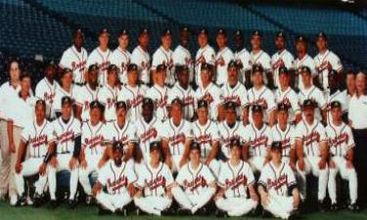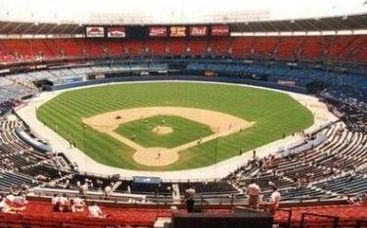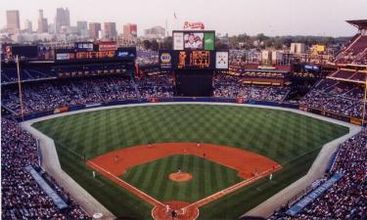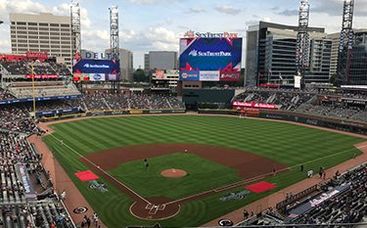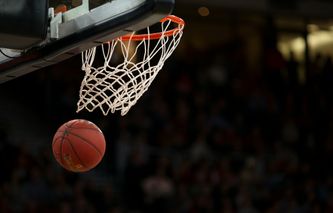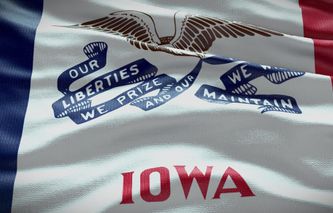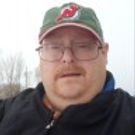 |  Logo 1990-Present | 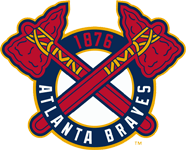 Alternate Logo 2012-Present |
|
Historical Moments
1966:On April 12th, the Braves host the Pittsburgh Pirates for the first Major League Game in Atlanta. The game would go 13 innings before the Pirates won 3-2. The Braves would finish in fifth place with an 85-77 record, in their first season in Dixieland, as Hank Aaron led the National League in home runs and RBI.
1967:The Braves endured their first losing season in 15 years when they played in Boston, as they finished in seventh place with a 77-85 record.
1968:Hank Aaron’s march for the all-time career home run record begins to gather momentum as Aaron hammers his 500th career long ball. On the field, the Braves once again play mediocre baseball, finishing in fifth place with an 81-81 record.
1969:With the acquisition of Orlando Cepeda, the Braves are able to land a solid hitter to back up Hank Aaron, who smashes 44 home runs. On the mound, the Braves are led by knuckleballer Phil Niekro who wins team-high 23 games. In late August, the Braves were mired in fifth place, but they would catch fire and outplay the San Francisco Giants and Cincinnati Reds to capture the first-ever Western Division Title with a record of 93-69. The Braves would host the first-ever NLCS game, a 9-5 loss to the New York Mets. The Mets would sweep the series in three games, but not before Hank Aaron hit three homers.
1970:Hank Aaron collects career hit 3,000th, while Rico Carty captures the batting crown with an impressive .366 average. However, it’s not enough for the Braves who finish in fifth place with a 76-86 record.
1971:Hank Aaron hits 47 HR en-route to surpassing the 600 career home run barrier. Meanwhile, catcher Earl Williams wins the Rookie of the Year by smashing 33 homers. However, the third-place Braves struggled just to finish above .500 at 82-80.
1972:Fulton County Stadium hosts the All-Star Game, but the Braves hardly looked like stars as they finished in 4th place with a record of 70-84, while Hank Aaron continued to move up the home run leaderboard with 34 more to move to within 41 of Babe Ruth’s all-time record.
1973:Benefiting from Fulton County Stadium’s launching pad Dave Johnson (43), Darrell Evans (41), and Hank Aaron (40) becomes the first three players from the same team hit 40 or more in the same season. Aaron’s hunt for the Babe’s record continues as he surpasses the 700-mark, and ends the season with 713 career homers, one short of Ruth’s record of 714. However, it won’t translate into wins for the Braves, who finished in fifth place with a 76-85 record.
1974:Hank Aaron does wait long to tie the Babe smacking his 714th home run on Opening Day in Cincinnati. The Braves’ home season would begin four days later, on April 8th, as the Atlanta Braves took on the Los Angeles Dodgers, as National Audience watched on NBC. Aaron would step up to the plate against Dodgers left Al Downing, and would hammer number 715 over the left-center power ally to become the all-time HR King. As Aaron rounded the bases, two young fans ran out to congratulate him. Aaron’s history-making shot was not the only reason for excitement in Atlanta as the Braves posted a solid 88-74 record while finishing strong under Manager Clyde King. He replaced Eddie Matthews in the middle of the season. Hank Aaron would go on to finish the season with 20 homers, before departing at the end of the year for the American League, and a position as the Milwaukee Brewers Designated Hitter. Aaron would go on to finish with an all-time high 755 career home runs.
1975:Without all-time home run king Hank Aaron, who was traded to the Milwaukee Brewers, the young Braves would falter, finishing in fifth place with a miserable 67-94 record.
1976:Communications Magnate Ted Turner, who recently transformed a local UHF station into a national Superstation, buys the Braves. Turner begins putting Braves games on the newly dubbed TBS, and the Braves can now be followed anywhere in the country. This move especially helps the Braves in markets where there are no Major League teams. This would cause Turner to bill the Braves as America’s Team. The move does not generate success on the field as the Braves finished last with a 70-92 record.
1977:During a 17 game losing streak owner Ted Turner fires manager Dave Bristol, and takes control of the team himself. The Braves would lose the 2-1 in Tuner’s managerial debut at Pittsburgh against the Pirates. Commissioner Bowie Kuhn did not take too kindly to the move and ordered Ted Turner to return to the owner’s box. Turner would reinstate Dave Bristol as manager, and the Braves would go on to finish in last place with a 61-101 record.
1978:After their miserable season, the Braves are awarded the first pick overall in the Major League draft. The Braves use their pick on Arizona State slugger Bob Horner. Horner would sign with Braves and immediately debut in Atlanta. In just 89 games, Horner would smash 23 home runs, and drive in 63 RBI to earn the National League Rookie of the Year. However, the Braves don’t fare much better, finishing in the cellar again with a 67-93 record.
1979:Knuckleballer Phil Niekro pulls off a rare feat of winning 21 games while losing 20 during another last-place season in which the Braves post a 66-94 record.
1980:With Dale Murphy hitting 33 home runs, the Braves end a string of last-place season, and finish with a somewhat respectable 81-80 record.
1981:The Braves are not a factor in either the first half or second half of the season posting a combined record of 50-56 as a two-month player’s strike splits the season.
1982:With new manager Joe Torre the Braves get off to a flying start and win their first 12 games. This established a new Major League record that would stand for five years. Meanwhile, Dale Murphy continues to develop himself as one of the premier hitters in the league, smashing 36 home runs and driving in 109 RBI, on the way to claiming the National League MVP. Despite struggling most of the second half, the Braves would find themselves in a three-way race for the Western Division title going into the final weekend of the season. The Braves would win end up winning the division with an 89-73 record, as the San Francisco Giants and Los Angeles Dodgers killed each other off in the final three games. In the NLCS, the Braves would suffer a washout as 1-0 lead, and a solid performance from Phil Niekro is wiped out as the rains interrupted Game 1 in St. Louis. The Cardinals would take advantage, winning 7-0, when Game 1 was played over from the start the following day. The Cards would go on to sweep the series in three games.
1983:Dale Murphy collects his second consecutive National League MVP while smacking 36 home runs, and driving in 121 RBI. The Braves would again challenge the Division title before falling three games short with an 88-74 record.
1984:Dale Murphy hits 36 home runs for the third straight season, but the Braves struggle with the loss of Phil Niekro and struggle to finish 80-82. After the season, the Braves fire manager Joe Torre, as they get set to rebuild the team.
1985:A July 4th game against the New York Mets ends up going way into the night. The game was interrupted several times by rain and went deep into extra innings. In the wild back and forth game, Pitcher Rick Camp was forced to hit for himself and ended up tying the game again. The Braves would eventually fall to the Mets in 19 innings, but not before the clock struck 4 AM. In an odd side note, the Braves decided to go ahead with a scheduled fireworks show, and ballpark neighbors were greeted with a wake-up call they would never forget. After the season, in which the Braves finished in fifth place, with a 66-96 record, the Brave rehire Bobby Cox, who managed the team from 1978-1981 to become the club’s General Manager.
1986:A four home run game by Bob Horner on July 6th is the only highlight of a 72-89 last-place season. As a symbol of the Braves’ futility, the Braves would even lose the game in which Horner blasted four homers. The season would end up being Horner’s last in Atlanta, as he would depart for a lucrative deal with Yakult Swallows in Japan. Horner was forced to sign with the Swallows, after not being able to find an offer from another team during the era of collusion. Horner’s contract situation of one of several suspicious Free Agent deals that winter, which would be used to uncover the owner collusion of Free Agents.
1987:The Braves unveiled a new look resembling their looks of the past with the Tomahawk returning to their uniforms for the first time in 25 years when they were the Milwaukee Braves. However, the current Braves would continue to sputter, finishing in fifth place again with a record of 73-88.
1988:The Braves stumble out of the gates, losing their first nine games on the way to a last-place finish with an awful 54-106 record that is their worst since moving to Atlanta.
1989:Despite an influx of young pitching talent, the Braves remain a doormat in the National League Western Division, finishing in last place for the third time in four years with a record of 63-97.
1990:During another last place, 65-97, the Braves stun their fans by trading Dale Murphy to the Philadelphia Phillies. Bobby Cox would also see a change in position, leaving his post as General Manager, to take over the reins of manager. Cox, would hold both jobs until the end of the season when John Schurleholtz was brought in to run the front office. Although the Braves were mired in the cellar again signs of a bright future were not hard to find young arms John Smoltz, Tom Glavine, and Steve Avery were showing signs of becoming top-notch pitchers while outfielder David Justice won the National League Rookie of the Year.
1991:Through the first half of the season, the Braves were improved, but were still nine and a half games out of first at the All-Star Break. However, they were able to slice seven games off the lead in the first 12 games after the break. What followed was a thrilling stretch drive during which the Braves and Dodgers were never separated by more than two and a half games after August 10th. Among many clutch performances were the National League’s first-ever combined no-hitter by Kent Mercker, Mark Wohlers and Alejandro Peña on September 11th against the San Diego Padres, and David Justice’s game-winning, two-run homer off Rob Dibble of the Cincinnati Reds on October 1st, capping a comeback from a 6-0, first-inning deficit. The Braves finally clinched the division title on October 5th, after an eight-game winning streak, the first six coming on the road, to set Atlanta records of 94 wins (including a 55-28 mark in the second half) and 2,140,217 in attendance. After the season, Tom Glavine would earn the NL Cy Young, while 3B terry Pendleton captured the MVP. In the NLCS, the Braves would face the Pittsburgh Pirates. After splitting the first games in Pittsburgh, the series shifted before the Fulton County Stadium, where the Tomahawk Chop was going strong. After the Braves took Game 3, the Pirates would take the next two games to return to Pittsburgh with a 3-2 series lead. The strong pitching of the Braves would not be stopped as Tom Glavine and NLCS MVP Steve Avery shutout the Pirates in the final two games to advance the Braves to the World Series. In the World Series, the last to first Braves would face the last to first Minnesota Twins. After the Twins took the first two games in Minnesota, the series shifted to a soldout Fulton County Stadium. The Braves would win Game 3 in 12 innings on a Mark Lemke singled home David Justice in a game highlighted by a bone-chilling collision at home plate involving Greg Olson and the twin Dan Gladden. The Braves would also win Game 4, in another thriller as Lemke, a .234 hitter in the regular season but a .417 batsman in this series, tripled with one out in the ninth and the score tied at 2-2. He then raced home on journeyman Jerry Willard’s fly ball to right, just avoiding the tag by catcher Brian Harper. After the Braves won Game 5 in a blowout, the series shifted back to Minnesota with the Braves up three games to two. However, the Braves’ magic would end there, as the Twins won the final two games in extra innings to capture the World Series.
1992:The Braves prove 1991 was not a fluke by repeating as National League Western Division Champions with an impressive 98-64 record. In the NLCS, the Braves once again face the Pittsburgh Pirates, and quickly jumped out to a 3-1 series lead. However, the Pirates would battle back to win the next two games to force a seventh and deciding game at Fulton County Stadium. The Pirates would take a 2-0 lead to the ninth inning, but the braves would rally finally scratch the scoreboard, and with two outs had the tying and winning runs in scoring position. However, the Braves were down to one pinch hitter, and that was little used Catch Francisco Cabrera. Cabrera would hit the ball through the shortstop hole to tie the game while slow-footed Sid Bream rounded third. Bream would slide home just under Mike Lavaliere tag to send the Braves back to the World Series with a dramatic 3-2 win. In the first-ever International World Series, the Braves faced the Toronto Blue Jays. After taking Game 1, the Braves took a 4-3 lead into the ninth inning of Game 2. However, the Jays would win the game as Utilityman Ed Sprague blasted a two-run Pinch Hit HR off Jeff Reardon to tie the series at a game apiece. The series would travel up north of the border for the first time, where the Jays won Game 3, with a Candy Maldonado single over a drawn-in outfield in the ninth inning. The Jays would also win Game 4 to take a 3-1 series lead. However, the Braves bounced back to send the series back to Atlanta with a 7-2 victory in Game 5. Down 2-1 in the ninth inning, the Braves used two-out magic to tie the game and force extra innings. However, Dave Winfield would give the Jays a 4-2 lead with a dramatic double in the top of the 11th. The Braves would not go down without a fight scoring a run, and having the tying run on base before Otis Nixon’s two-out bunt attempt was fielded cleanly to give Canada its first-ever World Series Championship.
1993:Through much of the first half of the season, the Braves played solid baseball but found themselves far behind the San Francisco Giants, who were running away with the division. On July 19th, the Braves acquired Fred McGriff in a trade with San Diego Padres. The next day before McGriff’s Braves debut, a press box fire caused minor damage to Fulton County Stadium after the fire was put out. McGriff lit another fire hitting a home run to ignite a rally from 5-0 defect to a dramatic 8-5 win over the Cardinals. The fire caused by Fred McGriff would rage out of control as the Braves would play 54-19 baseball over the last 73 games of the season to overtake the Giants ten-game lead and win the Western Division by one game with a 104-58 record. However, the Braves one weakness would be exposed in the NLCS as the Philadelphia Phillies took advantage of the Braves’ weak bullpen to stun the Braves in six games to advance to the World Series.
1994:The Braves opened the campaign in the newly realigned National League, attempting to capture their fourth straight division crown in their new home, the National League Eastern Division. The Braves began the season in record fashion, winning their first games, all on the road, during the streak Kent Mercker no-hit the Dodgers, 5-0 on April 8th in Los Angeles. However, shortly after the All-Star Break, the Montreal Expos would overtake the Braves for the division lead. The Braves would see the Expos race past them establishing a six-game lead on August 12th, although not in first place, the Braves were in position for a Wild Card Berth with a record of 68-46 a player’s strike suddenly ended the season. After the aborted season Greg Maddux who led the National League in wins, would capture his second straight Cy Young as a Brave, and third overall.
1995:When play resumed after a spring of replacement players, and court decisions the Braves saw most of their completion for the division sold off and traded away as the Montreal Expos, could not afford to keep them. One of those players, Marquis Grissom, even landed in Atlanta. The Braves would cruise to the Division Title with a 90-54 record, 21 games better than their completion. In the NLDS, the Braves faced the third year Colorado Rockies. The Rockies would prove pesky sending Game 1 to extra innings and winning Game 3, but the Braves would emerge victorious in four games. The Braves would go on to make quick work of the Cincinnati Reds in the NLCS sweeping them in four straight to advance to the World Series. In the World Series, the Braves were matched up against the Cleveland Indians, who dominated the American League all year. The Braves would take the first two games of the series behind the pitching of Greg Maddux and Tom Glavine. After the Indians won Game 3 in extra innings, the Braves would take a 3-1 series lead behind the pitching of Steve Avery, setting up Greg Maddux to close the series out in five games. However, the Tribe would defeat Maddux to send the series back to Atlanta. Before Game 6, David Justice popped off on how the fans were not entirely behind the team, when Justice first come up he was booed, but it would quickly shift to cheers as his home run in the sixth inning gave the Braves a 1-0 lead. With World Series MVP Tom Glavine pitching one-hit baseball for eight innings, it was enough as Mark Wohlers came into close out the World Series and gave Atlanta it’s first-ever World Championship.
1996:The Braves waltz to another National League Eastern Division title with a 96-66 record, while Greg Maddux sees his four-year reign as Cy Young end with teammate John Smoltz earning the honors. After the Braves quickly dispatched the Los Angeles Dodgers in three games of the NLDS, the Braves would move on to face the St. Louis Cardinals in the NLCS. Beating the Cardinals would not be as easy, and the Cards jumped out to a surprising 3-1 series lead. However, the Braves would come storming back, blowing the Cardinals out in the final three games to advance to their fourth World Series in six years. The momentum carried on into the first two games of the World Series in which the Braves won by a combined score of 16-1, as Yankee Stadium. As the series shifted to Fulton County, for what would the 30-year-old stadium’s final game Braves fans expected the Braves to cap off their second straight championship with a sweep, but after the Yankees won Game 3, all of a sudden it was a series again. In Game 4, the Braves jumped out to a 6-0 lead and were poised to take a 3-1 series lead, when the Yankees rallied. After slicing the lead in half in the sixth, the Yankees would tie the game on a Jim Leyritz three-run home run off Mark Wohlers in the eighth inning. The Yanks would go on to win in extra innings, to tie the series at two games apiece. The Braves would ever recover, as the Yankees took the series in six games.
1997:The Braves inaugurate Turner Field, which was used the previous summer for the Olympics, in style by winning 12 of their first 13 at the Ted. The Braves would go on to capture yet another Division Title with a 101-61 record, beating out the Wild; Card winning Florida Marlins by nine games. After sweeping the Houston Astros in the NLDS, the Braves would face the same Marlins in the NLCS. However, the Marlins would prove pesky winning Game 1 with the stellar pitching of Kevin Brown, after the Braves won Game 2, the series would go to Miami, where noted Braves killer Tony Saunders beat the Braves again to give the Marlins a 2-1 series lead. The Braves would bounce back to take Game 4 and would go into a crucial Game 5 facing an unproven rookie. However, the rookie named Livan Hernandez would have the game of his life striking out 15 Braves on the way to giving the Marlins a 3-2 series lead, as the series shifted back to Atlanta. However, even the home field could not save the Braves from the upset as the Marlins behind Kevin Brown too Game 5 to advance to the World Series.
1998:It is another fantastic season for the Braves, as Tom Glavine won the National League Cy Young Award, his second, with a 20-6 record. The team wins 106 games and its seventh division title in eight years. The Braves met the Chicago Cubs in the Divisional Playoffs and won easily in three straight games. The San Diego Padres were the opponents in the NLCS. After losing the first three games, the Braves won two dramatic contests in San Diego, before falling in six games.
1999:At the outset of spring training, the Braves were stunned to hear that Andres Galarraga would be lost for the season because of non-Hodgkin’s lymphoma, a form of cancer in his lower back. They also saw closer Kerry Ligtenberg go down with a season-ending medial collateral ligament tear in his right elbow. Despite these losses and season-ending injuries to Javy Lopez, Odalis Perez, and Rudy Seanez during the summer, Braves managed to win 103 games and claim their eighth division title in nine years. The team blew open a tight race with the New York Mets by taking five of six games from the New Yorkers in late September, highlighted by Chipper Jones’ four home run barrage in a three-game sweep in Atlanta, which served as his springboard to the MVP Award. After losing Game 1 in the NLDS, the Braves would bounce back to take the next three to advance to the NLCS for the 8th straight season. In the NLCS, the Braves would jump out quickly, grabbing a 3-0 series lead, but the Mets would win the next two dramatically to send the series back to Atlanta 3-2. The Braves would jump out to a 6-0 lead in the sixth game, but the Mets would come back again and send the game to an extra inning. The Braves would eventually win the game and the series on a bases-loaded walk to Gerald Williams, but the Braves were heading into the World Series tired out. In the World Series, the Braves faced the New York Yankees for the right to be called the team of the ’90s. The Braves would see a 1-0 lead melt in the last innings of Game 1, as the bullpen allowed four runs in the eighth inning, as the Braves lone hit was a Chipper Jones home run. After losing Game 2, the Braves would grab a lead in Game 3, but two home runs by Chad Curtis, including an extra-innings game-winner, would give the Yanks a 3-0 series lead. Beaten and disheartened Game 4 was a mere formality as the Braves saw the Yankees completed the sweep.
2000:In a season highlighted by a 15-game winning streak, the Braves finish 95-67 to edge out the New York Mets by one game on the way to another Division Title. However, a loss in the final game of the season cost the Braves home-field advantage in the NLDS. Subsequently, the Braves are swept by the St. Louis Cardinals as Division Series. The Braves usually reliable pitching saw sub-par outings by Greg Maddux (4.0 IP, 5 ER), Tom Glavine (2.1 IP, 7 ER), and Kevin Millwood (4.2 IP, 4 ER) led to a quick three-game exit ending their streak of NLCS appearances.
2001:Celebrating their tenth season winning divisions, the Braves once again finish in first place. However, it is not done with the same style as usual, as the Braves only manage to win 88 games to hold off a season-long challenge from the Philadelphia Phillies, and a late surge by the New York Mets. Heading into the NLDS, the Braves were the underdogs going up against the Central Division Champion Houston Astros, but an eighth-inning, three-run home run by Chipper Jones gave the Braves the first game. The momentum of this win helped the Braves take the next two and complete the three-game sweep over the Astros. In the NLCS, the Braves would face the Arizona Diamondbacks. After splitting the first two games in the desert, the series moved to Atlanta, where the D-backs won Game 3 behind the stellar pitching of Curt Schilling. The D-backs would rough up a shaky Greg Maddux in Game 4 to give the D-backs a 3-1 series lead before Randy Johnson shut down the Tomahawk for another season with a win in Game 5.
2002:The Braves have cruised to their eighth straight National League Eastern Division Title leading by more than double digits most of the season on the way to a 19 game cushion at season’s end with a 101-59 record. Along the way, the Braves found a way to revitalize John Smoltz’s career as he becomes the closer setting a National League record in saves with 55. Come the postseason; there would be no saving the Braves as they would fall in the Division Series to the San Francisco Giants in five games. Tom Glavine, who was the first of the dominating Braves pitchers to make his debut in 1987, would stun Braves fans following the season when he departed via free agency signing with Braves rival New York Mets.
2003:Despite the loss of Tom Glavine, the Braves remained the dominant team in the National League East, winning the division, easily again with a record of 101-61. However, unlike previous seasons it was not the Braves pitching that made the difference. It was their hitting as they led the league in most offensive team categories, including runs, homers, and batting. Leading the way for the offensive attack was Javier Lopez, who hit a record 43 home runs for catchers. Joining Lopez in the attack was Gary Sheffield, Andruw Jones, and Chipper Jones, who all had over 100 RBI. Sheffield and the Jones boys would be joined by middle infielders Rafael Furcal and Marcus Giles, who had a breakout season with 21 homers joined in to give the high scoring Braves five different players with over 100 runs scored. On the mound, the Braves were led by Russ Ortiz, who won a league-high 21 games. At times the Braves pitching struggled, as Greg Maddux was mediocre most of the season, while the Braves team ERA was an average 4.09. In the playoffs, the Braves would be matched up against the Chicago Cubs, who had not won a playoff series in 95 years. However, the Cubs 1-2 pitching punch of Kerry Wood and Mark Prior would shut down the Braves bats all series taking Game 1, 3, and 5 to stun the Braves in the best of five series. Following the season, the Braves would suffer more losses as they lost Lopez, Sheffield, and Maddux to free agency, as the Braves were forced to cut payroll.
2004:The Atlanta Braves would sorely miss Gary Sheffield and Javier Lopez early in the season as they got off to a slow start that saw them sitting with a 33-39 record on June 25th along the way Braves. The low point of the early struggles came in back-to-back games in May when they were struck out 18 times against Milwaukee Brewers ace Ben Sheets, and had a Perfect Game thrown against them by Randy Johnson of the Arizona Diamondbacks. However, as summer began, the Braves bats started to heat up led by J.D. Drew, who had a team-high 31 homers as the Braves climbed back over .500 and into the race in a mediocre NL East. In July and August, the Braves were unbeatable winning 40-of-54 games to climb back into first place where they would go on to win their 13th straight division title in completed seasons with a 96-66 record. Earning recognition for the Braves’ stunning in-season turnaround was Bobby Cox, who was named Manager of the Year for the first time since 1991 when the Braves run began. In the playoff, the Braves had a familiar opponent in the Houston Astros, whom they had beaten in the NLDS three times previously. From the start, things would be different as Carlos Beltran caught fire as helped power the Astros to a 9-3 win in Game 1, after Rafael Furcal even the series with a two-run walk-off home run in the 11th Inning of Game 2, Beltran again hammered Braves pitching with four RBI in 8-5 Astros win. Facing elimination in Game 4, Adam LaRoche hit a three-run homer in the sixth inning to tie the game 5-5, as J.D. Drew smashed a solo homer to give the Braves a 6-5 win which sent the series back to Atlanta for a decisive fifth game. However, for the third year in a row, the Braves season would end in Turner Field as the Astros won en route with Beltran hitting two homers and knocking in five runs to bring his series total to four home runs and nine RBI as the Astros won 12-3.
2005:Once again, the Braves would get off to a slow start as they found themselves hovering around .500 in the middle of June at 33-32. The Braves would have a myriad of problems as newly acquired closer Danny Kolb struggled badly and would eventually be seen as unreliable, leaving the Braves to have a closer by committee. Meanwhile, injuries to players like Chipper Jones, and pitchers like Mike Hampton led to unproven Rookies to get the call early. The rookies would provide just the spark the Braves needed as outfielder Jeff Francoeur and catcher Brian McCann who grew up doing the Tomahawk Chop in the suburbs of Atlanta, made an immediate impact after being called up. Both established themselves as fans favorites, as the Braves began their move. As the All-Star Game approached, the Braves won 17-of-22 to climb within a few first-place games. After the All-Star Break, the Braves remained hot, quickly grabbing first place away from the Washington Nationals with the help of a three-game sweep at the end of July. While it was, the young Braves helped provide the spark, Andruw Jones, who was the team’s MVP with a franchise-record 51 homers, which helped him become the first Brave to win the Hank Aaron Award. On the mound, the Braves were led by John Smoltz and newly acquired Tim Hudson, who each won a team-high 14 games. However, it was perhaps the performance of Jorge Sosa. He went 13-3 after being picked up off the trash heap from the lowly Tampa Bay Devil Rays that helped the Braves continue their starting pitching dominance, which was extremely important with the bullpen struggling as severely as it did. The Braves would go on to win the National League East again by two games over the Philadelphia Phillies with a 90-72 record, extending their remarkable run to 14 straight Division Titles in completed seasons. Bobby Cox won another Manager of the Year Award. In the playoffs, the Braves would draw a rematch with the Houston Astros, once again they would fall behind losing Game 1 as Tim Hudson struggled 10-5. The Braves would rebound to win Game 2 behind Smoltz 7-1, as the series shifted to Houston. After losing Game 3, the Braves appeared to be bringing the series back to Atlanta for a decisive fifth game as they led 6-1 in the eighth inning. However, their pen would implode as the Astros rallied to send the game to extra innings on an eighth-inning Grand Slam by Lance Berkman and a solo shot by Brad Ausmus in the ninth inning. From there, each side would put up nothing for the next eight innings as Roger Clemens came in the game and silenced the Braves bats before Chris Burke hit a walk-off homer off Joey Devine to end the Braves season again 7-6.
2006:It is written that all good things must come to an end, and for the Atlanta Braves, the end came in 2006, as they once again got off to a slow start and ended April with a 10-14 record, and found themselves five games behind the New York Mets. The Braves would rebound for a strong, May climbing back over .500 at 28-25. In June, the bottom simply fell out as injuries, and an unreliable bullpen combined smother the Braves as they post a terrible 6-21 record their worst month since moving to Atlanta. The Braves bounced back in July and began to make their move to get into Wild Card contention after the All-Star Break as they came out smoking, scoring ten or more runs in five straight games. The Braves came back to reality at the end of the month as the Mets came into Atlanta and swept the Braves in three consecutive games erasing any hope of another division title. The Braves would do some retooling at the trade deadline acquiring Bob Wickman for the closer role, which was a weak spot for the Braves all season as they blew a league-high 29 saves. It would not be enough as the Braves never made a run, and finished the season in third place with a record of 79-83.
2007:With the hopes of regaining their crown in the Eastern Division, the Braves concentrated on their bullpen by re-signing Bob Wickman while acquiring Mike Gonzalez and Rafael Soriano. Early on, it worked as the Braves jumped out to a fast start winning seven of their first eight games as they ended April in first place with a record of 16-9. In May, the Braves struggled to slip behind the New York Mets, as Andruw Jones playing for a new contract found himself helplessly in a season-long slump as he ended the season with a career-low batting average .222, with 26 home runs and 94 RBI. The Braves’ struggles continued into June, as they posted a dreadful 4-11 record and fell to .500 on June 24th. Meanwhile, the bullpen was not holding up as planned as Wickman struggled and Gonzalez was lost for the season after needing Tommy John surgery on his elbow. While Andruw Jones struggled, Chipper Jones continued to put up an All-Star performance as he became the Braves all-time leading home run hitter since the club moved to Atlanta. Another longtime Brave making history was John Smoltz, who took over the franchise lead in career strikeouts. Still struggling to live up to expectations, the Braves landed slugging 1B Mark Teixeira and reliever Ron Mahay from the Texas Rangers at the trade deadline for Ron Mahay from the Texas Rangers for Jarrod Saltalamacchia and four minor-leaguers. Teixeira made an instant impact hitting a three-run homer in his Braves debut as the Braves clubbed the Houston Astros at Turner Field 12-3. Teixeira would hit home homers in his next two games, but the Braves were unable to win, as the Braves never made their move on the division leaders, as an ineffective Bob Wickman was released in August. The Braves would end up the season finishing in third place with a record of 84-78, as the Braves said goodbye to Andruw Jones, choosing not to resign their longtime stalwart in Centerfield. The Braves would also say goodbye to TBS following the season. One time, Super Station evolved to a National Cable powerhouse, carrying a national package of Sunday Afternoon Baseball games and the postseason. However, the off-season would see the return of another Braves legend as they signed Free Agent Tom Glavine, who spent five years with the Mets, winning his 300th game in 2007.
2008:With the return of Tom Glavine, the Braves entered the season with renewed optimism. However, Glavine would only win twice, before injuries forced him to the sideline. Injuries also hit John Smoltz, who made just five starts before undergoing season-ending shoulder surgery. Tim Hudson was forced to undergo Tommy John surgery, to fix a torn elbow ligament. With the starting staff ravaged with injuries, the Braves never were seriously in the playoff chase. Below .500, the Braves decided to cut their losses and start concentrating on the future after the All-Star Break as they traded free agent to be Mark Teixeira to the Los Angeles Angels for first baseman Casey Kotchman and minor league RHP Stephen Marek. While Mark Kotsay, who was acquired in the off-season from the Oakland Athletics, was dealt to the Boston Red Sox for a minor leaguer. August would be a horrible month for the Braves on and off the field, as they posted a terrible 9-20 record, while longtime announcer Skip Caray died on August 3rd. The Braves would go on to finish in fourth place with a 72-90 record. Following the season, the Braves would not re-sign free agent John Smoltz, who, after 20 years in Atlanta, decided to continue his career with the Boston Red Sox. The Braves would also say goodbye to another longtime announcer as Pete Van Wieren announced the retirement following the season.
2009:While the Braves initially decided to re-sign Tom Glavine, he would be released before pitching another game. Meanwhile, the Braves rebuilt their pitching staff free agent pitcher Derek Lowe to a four-year contract. At the same time, trading for Javier Vazquez, whom they acquired along with Boone Logan, from the Chicago White Sox for catcher Tyler Flowers, shortstop Brent Lillibridge, third baseman Jon Gilmore, and pitcher Santos Rodriguez. The Braves also would take a flyer on Japanese pitcher Kenshin Kawakami. The remade Braves played mediocre baseball early in the season, as they spent the first two months wading around the .500 mark. Hoping to add a spark, the Braves acquired Nate McLouth from the Pittsburgh Pirates on June 3rd for prospects Jeff Locke, Charlie Morton, and Gorkys Hernandez. In 84 games with the Braves, McLouth would hit 11 home runs, with 36 RBI, while delivering a .257 average. The Braves would slip below .500 in June, posting an 11-15 record. In July, the Braves would bounce back and get back to .500, as Jeff Francoeur is traded to the New York Mets for Ryan Church. In August, the Braves would finally get past the .500 mark and make a move on the wild card spot, as they posted a solid 17-11 record. They would carry the momentum into September as they came within two games of the Wild Card leading Colorado Rockies. It was not meant to be as the Braves finished the season with a six-game losing streak and slipped into third place with a record of 86-76. As the season came to an end, longtime manager Bobby Cox announced his plans to retire following the 2010 season.
2010:As the season began, there was a feeling of the last hurrah for the Braves as Bobby Cox was set to retire at the end of the season. Free Agent Billy Wagner signed a one year contract for his final shot at reaching the World Series as the Braves closer. It was also the dawning of a new era as Jason Heyward; the Braves top prospect hit a three-run home run in his first Major League at-bat as the Braves walloped the Chicago Cubs 16-5 on opening day. Heyward would get off to a tremendous start as he was named Rookie of the Month in both April and May. Despite the play of Heyward in April, the Braves slumped in the first month posting a record of 9-14 as they sat in last place. However, April struggles led to a Braves blooming in May as they posted a 20-8 mark and entered June in first place. The Braves would still be in first place at the All-Star Break, as Rookie sensation Jason Heyward was voted in to start for the National League. However, he was unable to play with a thumb injury. Brian McCann was able to play, and his clutch two-out, three-run double in the seventh inning gave the National League a 3-1 win in Anaheim, giving the senior circuit its first win in the All-Star Game since 1996. McCann would be named All-Star Game MVP. The Braves would retain their lead over the Philadelphia Phillies in the National League East until September when a series of injuries began to take their toll. Perhaps the most costly injury was the loss of Chipper Jones, who suffered a season-ending knee injury on August 12th. Troy Glaus, who contributed early at first base, struggled the entire second half with knee fatigue; the Braves would acquire Derek Lee from the Chicago Cubs in an attempt to add some offense. While the Braves the Phillies pulled away down the stretch to win the division title, the Braves continued to remain in front for the Wild Card. On September 25th, the Braves shutout the Washington Nationals 5-0 on the road, earning Bobby Cox his 2,500th career win, as a manager, good for fourth place on the all-time wins list. The Braves would enter the final day of the season needing a win to assure them of a chance at the playoffs, as they were in a tie with the San Diego Padres for the Wild Card. The Braves would beat the Phillies 8-7, and clinch the Wild Card a few hours later as the San Francisco Giants defeated the Padres. Jason Heyward, who hit 18 home runs with 72 RBI, would finish second in Rookie of the Year voting. In the NLDS, the Braves would face the Giants and find themselves in an old fashioned pitcher’s duel in Game 1, between Derek Lowe and Giants ace Tim Lincecum. Lowe would give up a run in the fourth inning, and it would be enough as Lincecum confounded the Braves all night pitching a complete game two-hitter while striking out 14. The Braves would find themselves in a quick 4-0 hole in Game 2, but they would rally to win 5-4 on Rick Ankiel’s home run in the 11th inning. However, injuries continued to affect the Braves as they would lose Closer Billy Wagner. As the series shifted to Turner Field, the Braves had a chance to take control of the series, leading 2-1 in the ninth inning. Brooks Conrad playing second base for an injured Martin Prado, committed three costly errors as the Giants rallied to win the game 3-2. The Giants would also win 3-2 in Game 4 to end the Braves season, as the fans gave Bobby Cox a standing ovation. Following the season, the Braves would name Fredi Gonzalez as the team’s first new manager in 20 years.
2011:For the first time in two decades, the Braves began a season without Bobby Cox in the dugout. Replacing him would be Fredi Gonzalez, who served several seasons on Cox’s coaching staff. The Braves would get off to winning start under Gonzalez beating the Washington Nationals 2-0 as Derek Lowe got the win, and Jason Heyward went deep for the second straight season on opening day. After posting a 3-4 record in the first week of the season on the road, the Braves would beat the Philadelphia Phillies 6-3 in their home opener, as Chipper Jones became the ninth switch hitter to collect 2,500 hits. A few days later, with a home run against the Florida Marlins, Jones would join Eddie Murray as one of just two switch hitters with 2,500 hits and 1,500 RBI. The Braves would have an up and down first month of the season, as they ended April with a record of 13-15. In May, the Braves would start rolling as they began the month with a six-game winning streak to vault over .500. They would play well the entire posting a 17-11 record. In one game on May 17th against the Houston Astros, Brian McCann tied the game with a pinch-hit home run in the ninth inning and then won the game with a home run in extra innings just the second player to complete this unique feat. The only other play to do it was Jeff Heath of the Boston Braves in 1949. The Braves would continue to roll in June, posting a 17-9 record. Despite their strong record, the Braves could not overtake the Phillies for first place. However, they established themselves as the front runner in the battle for the Wild Card. The Braves would end the first half with a record of 54-38, as Rookie Closer Craig Kimbrel set a record for rookies with 28 saves before the All-Star Game. While Kimbrel was having a breakout season, 2010 rookie sensation Jason Heyward had a disappointing second season, with 14 homers and a meager 42 RBI, while hitting lightly at .227. On the way to a disappointing season was opening day starter Derek Lowe who posted a 9-17 record with an awful 5.05 ERA. Helping to make up for the struggles was Jair Jurrjens, who had a solid season with a 13-6 record and an ERA of 2.96. On the first day after the All-Star Break, the Braves made history again, beating the Nationals 11-1 at Turner Field. The win was 10,000th in Brave’s history dating back to their days in Boston in 1876. Only the Giants and Cubs had won more games. The Braves continued to play strong baseball throughout the summer. They ended August with a record of 80-55, as Kimbrel, who would be named Rookie of the Year in the National League, set a rookie record with 46 saves, closing out a 3-1 win over the Nationals on August 31st to break the one-year-old record of Neftali Feliz. The Braves appeared to be cruising toward a second straight playoff appearance with an eight-and-a-half-game lead over the St. Louis Cardinals in the Wild Card chase. However, as September arrived, the Braves season suddenly went into a tailspin. Injuries were a huge factor as the Braves starting pitchers Jair Jurrjens, and Tommy Hanson went on the disabled list. At the same time, key players went into a slump, and the whole team began to fall apart. On a trip into St. Louis, the Braves would be swept by the Cardinals, who were suddenly gaining on the Braves in the race for the Wild Card. The Braves would post a record of 9-18 in September as they lost their last five games. In the final game of the season, the Braves would see their season slip away as they lost to the Phillies 4-3 in 13 innings after Craig Kimbrel blew a 3-2 lead in the ninth inning. With the loss, the Braves would be eliminated by the Cardinals who caught the Braves a day earlier and won the Wild Card by one game overcoming an eight and half-game lead. The Cards would go on to win the World Series, as Braves fans had the bitter taste of a September collapse to strew over in the off-season.
2012:After their September collapse, the Braves, for the most part, kept their roster intact as they looked to their young talents such as Jason Heyward and Freddie Freeman to take a more significant role in the team. The season was already one of transition as Chipper Jones announced early on he would retire after the season was over. The Braves stumbled out of the gate with some lingering injuries as they were swept by the New York Mets in a three-game series to start the season. After dropping a fourth straight game to the Houston Astros, the Braves finally found the winning formula before coming home to Turner Field for the first time all season with a record of 2-4. At home, the Braves quickly shook off their poor start and won 10 of 11 games on the way to posting a solid 14-8 record during April. One early star for the Braves was closer Craig Kimbrel, who continued to dominate out of the bullpen, saving eight games in April on the way to winning the Reliefman Award with 42 saves, as he averaged 16.7 strikeouts per nine innings. The Braves would have their ups and downs in May as they suffered an eight losing streak after holding the top spot in the National League East for several games. As expected, the Braves would have several issues with injuries as Chipper Jones, who was still able to provide a potent bat in the middle of the lineup with 14 home runs, 62 RBI and a .287 average battled injuries again and was limited to 112 games. However, the Braves would get a strong season from Jason Heyward, who led the team with 27 homers, while Freddie Freeman led the team 94 RBI. While the Braves were among the best hitting teams in the National League, the same could not be said for their pitching staff, which had troubles all season beginning with Jair Jurrjens, who was demoted to AAA after getting rocked in his first two starts. Jurrjens would struggle all season, finishing with a record of 3-4 with a hefty 6.89 ERA. The ace of the Braves staff would be Tim Hudson, who won 16 games and had a solid 3.62 ERA. However, demonstrating the Braves’ desperation for starting pitcher, they signed Ben Sheets. The latter had not pitched in two years with an elbow injury after a team tryout and had him start against the Mets after making just one start in minors. Sheets looked like his old self allowing only two hits in a 6-1 win as the Braves went into the All-Star Break with a record of 49-39. Sheets pitched well early, but eventually, his elbow flared up again and forced him back into retirement. In the second half, the Braves would find another starter who provided lightning in a bottle in the form of Kris Medlen, who missed nearly the entire 2011 season and became a starter at the end of July. Going back to his debut, the Braves had never lost when he started, and this became a theme of the last two months of the season, as Medlen suddenly was one of the best pitchers in baseball, posting a 10-1 record. Even more impressive Kris Medlen was 9-0, with a 0.97 ERA in 12 starts, as the Braves set a Major League record as they won his first 23 games as a starter dating back to his debut in 2009. With Medlen and Hudson anchoring the staff and the thunder in the lineup, the Braves would secure one of the National League’s two Wild Card spots, as their late punch for the division fell three games short as they post a record of 94-68.
2012 Wild Card Game:A year after the St. Louis Cardinals flew passed the Braves on the final day of the regular season, Turner Field was the site for baseball’s first-ever one-game Wild Card play-in games as the Braves hosted the defending champs. With a winner take all format, the Braves turned to Kris Medlen to make the start. The Braves would strike first on a two-run home run by David Ross in the 2nd inning. In the fourth inning, the Cardinals would score three runs, helped out by an error from Chipper Jones. With the Cardinals leading 6-3 in the bottom of the eighth inning, the Braves appeared to load the bases with one out. However, umpires ruled Andrelton Simmons’ fly ball to short left an infield fly, leading to a double play and mass hysteria as fans littered the field. After the dust settled, the Braves would find themselves on the stick, losing the game 6-3.
2013:After their controversial loss in the first-ever Wild Card game, the Braves looked to take a step forward by acquiring both B.J. Upton and Justin Upton to replace the offense lost with the retirement of Chipper Jones. B.J. Upton was a free agent signing, while Justin Upton was acquired for the Arizona Diamondbacks along with Chris Johnson for Martin Prado, Randall Delgado, and three minor league prospects. The Braves got off to fast start, winning 13 of 15 games, highlighted by a ten-game winning streak that saw the Braves sweep the Washington Nationals on the road. Among the Braves who got off to great starts were Evan Gattis, who hit six home runs with 16 RBI to lead all rookies in April, while Tim Hudson recorded the 200th win of his career. The Braves had their difficulties in May, but the month would be salvaged with an eight-game winning streak, which kept them at the top of the National League East. The Braves would continue to have their up and down streaks in June. The Braves had their ups and downs in the lineup as Justin Upton started strong and was named Player of the Month in April, while B.J. Upton disappointed all season and batted below .200. Dan Uggla also spent most of the season below the Mendoza line but managed to hit 22 home runs with 55 RBI. Freddie Freeman was the Braves’ most reliable hitter batting .319 with 23 homers and a team-high 109 RBI. However, strong performances against the Nationals made sure they controlled the Eastern Division. After hitting the All-Star Break with a record of 54-41, the Braves used another big winning streak to all but clinched the division championship. The 14 game winning streak included sweeps of the St. Louis Cardinals and Nationals as the eventually built a 15 game lead. A big key to the Braves’ success was their bullpen, which was one of the most reliable in baseball as Craig Kimbrel continued to be a lockdown closer with 50 saves. Kimbrel, along with David Carpenter and Luis Avilan, all had an ERA below 1.80. Leading the rotation was Kris Medellin, who had a team-high 15 wins, while Julio Teheran had a breakout season, posting a record of 14-8 with an ERA of 3.20. The Braves would go on to win the division by ten games with a record of 96-66, as they had to overcome several critical injuries in the final two months with Tim Hudson suffering a broken ankle covering first base, while Jason Heyward had his jaw broken when he was hit by a pitch.
2013 NLDS:In the NLDS, the Braves would face the Los Angeles Dodgers and ran into a buzz saw in Game 1, as Clayton Kershaw struck out 12 batters as the Dodgers took the opener at Turner Field 6-1. The Braves would bounce back with a 4-3 win in Game 2, as they got a solid start from Mike Minor, a big RBI hit by Jason Heyward and a four-out save from Craig Kimbrel. As the series shifted to Los Angeles, Julio Teheran struggled in his first postseason start as the Dodgers offense pounded the Braves with a 14 hit attack to win the game 13-6. The Braves would again have to face Clayton Kershaw in Game 4 but managed to hold a 3-2 lead after seven innings despite two solo homers from Carl Crawford. With the game on the line in the eighth inning manager, Fredi Gonzalez opted to have David Carpenter pitch, instead of overworking Kimbrel. Still, the decision ended up poorly as Jose Uribe hit a two-run homer off Carpenter to nail shut the Braves playoff hopes as the Dodgers went on to close the series with a 4-3 win.
2014:Coming off a division title, the Atlanta Braves looked to take another step forward as they hoped they could finish the season stronger and get past the Division Series. Before the season began, the Braves were dealt a double dose of bad news as Brandon Beachy and Kris Medlen underwent Tommy John surgery during spring training to replace a torn Ulnar Collateral Ligament in their elbow. Early on, things looked good for the Braves, despite a 2-0 opening day loss to the Milwaukee Brewers as they won four of their first six games on the road, including a two of three from the Washington Nationals before their home opener. The Braves home opener came on the 40th anniversary of Hank Aaron breaking Babe Ruth’s record, and the Hall of Fame slugger was honored, but the opener was spoiled by the New York Mets, who shut the Braves out 4-0. While the Mets would take two of three from the Braves, Atlanta would bounce back to sweep the Nationals over the weekend and move into first place as they posted a record of 17-8 in April. Despite struggles in May, the Braves held on to the top spot in the National League East through most of the first half of the season. Justin Upton was the Braves top hitter, leading the team with 29 home runs and 102 RBI. However, his brother B.J. Upton continued to struggle in Atlanta, batting .208 with just 12 homers and 35 RBI. Evan Gattis was another leading hitter for the Braves with 22 home runs, while Freddie Freeman led the team in hitting with a .288 average with 18 home runs and 78 RBI. Julio Teheran and Ervin Santana each won 14 games, while Craig Kimbrel was nearly perfect out of the bullpen, saving 47 games to win the first Trevor Hoffman Award. The Braves would enter the All-Star Break in a first-place tie with the Nationals, with a record of 52-43. As July came to an end, it would all begin to unravel for the Braves as they lost eight straight during a West Coast road trip. While the Nats had a strong August, the Braves slipped, posting a 13-13 record and entered September six games out of first place with a record of 72-65. The Braves record was good enough to be in the Wild Card hunt, but when September began their season quickly unraveled, as they lost 16 of 20 games. The disastrous streak would drop the Braves below .500 as they finished with a disappointing record of 79-83. As the season ended, the Braves began looking toward the future as construction started on a new stadium in Cobb County, Georgia. The Braves also looked within and decided to commit to rebuilding as the team would undergo wholesale changes.
2015:It was a time of change for the Atlanta Braves as they began to rearrange the roster in preparation for the move to the suburbs. As they played their penultimate season in Turner Field, the Braves underwent a full-fledged fire sale under the direction of new General Manager John Hart. Nearly the entire team was turned over as all three starting outfielders were traded while four starting pitchers (Ervin Santana, Aaron Harang, Kris Medlen, and Brandon Beachy) were not re-signed. Jason Heyward was dealt to the St. Louis Cardinals with pitcher Jordan Walden for pitchers Shelby Miller and Tyrell Jenkins. Justin Upton was shipped to the San Diego Padres with Aaron Northcraft for minor league prospects Max Fried, Jace Peterson, Dustin Peterson, and Mallex Smith. Catcher Evan Gattis and James Hoyt were traded to the Houston Astros for Mike Foltynewicz, Andrew Thurman, and Rio Ruiz. The trades continued right up to the start of the season as All-Star Closer Craig Kimbrel was sent to the San Diego Padres with B.J. Upton for Carlos Quentin and Cameron Maybin with prospects Jordan Paroubeck, Matt Wisler and the 41st overall draft pick. The deal was done solely so the Braves can get rid of the bad contract given to the now renamed Melvin Upton Jr. Carlos Quentin would be released without playing a game in Atlanta. With so much change, the season looked gloomy for the Braves, but early on, they played well, winning their first five games to start the season. For the first 70 games, the Braves were competitive, sitting at 70-70. As summer arrived, so did reality for the Braves as a wrist injury sidelined Freddie Freeman, the Braves leading hitter who finished the season with 18 home runs and 66 RBI. The loss of Freeman was huge as the rest of the lineup struggled to find any power as the Braves hit just 100 home runs as a team the worst in all of MLB. The Braves were also baseball’s lowest-scoring team with only 573 runs. The most significant illustration of the Braves lineup failures was Nick Markakis, who left the Baltimore Orioles to sign a four-year deal worth $44. Markakis, who averaged 15 home runs a season, did not leave the yard until July 21st, finishing the season with a mere three home runs and 53 RBI, despite a solid .296 average. Jason Grilli, who took over the closer role left by Craig Kimbrel, was having an excellent season for Atlanta, saving 23 games in the first half of the season, before a ruptured Achilles tendon on July 11th caused him the rest of the year. The Braves bullpen would be the worst in baseball in the second half. Struggles in the lineup and the bullpen had no more significant effect than on Shelby Miller. Miller was the symbol of the Braves season, after being acquired in the Jason Heyward trade. Early on, Shelby Miller was one of the best pitchers in baseball, posting a record of 5-1 with a 1.33 ERA over the first six weeks as he came within one out of a No-Hitter against the Miami Marlins on May 17th. The 6-0 win in Miami would be Miller’s last win until the next to last game of the season. Shelby Miller would make the All-Star team, but lose his next 16 decision as the Braves provided him with one of the worst run supports in baseball’s history at 2.38 runs per game. Despite an ugly 6-17 record, Shelby Miller managed a solid 3.01 ERA with 173 strikeouts. After completing a sweep of the New York Mets on June 21st, the Braves were 35-35. Over the next 77 games, the Braves were 22-55, finishing the season in fourth place with a record of 67-95.
2016:As the Atlanta Braves prepared for their final season at Turner Field, they were focusing on the future with a team that was unlikely to compete, but having several prospects on the doorstep ready to make an impact when they moved into SunTrust Park. As expected, the Braves struggled out of the gate, dropping their first nine games, after winning their next four games, went on another eight-game losing streak as they posted a record of 5-18 in April. The Braves struggles continued in May, as Manager Fredi Gonzalez was fired on 16th, after posting a 9-28 record over their first 37 games. Brian Snitker took over on an interim basis for the remainder of the season. The Braves slowly began to play better under Snitker as they went on a six-game winning streak in June that included a sweep of the defending National League Champion New York Mets in Citi Field. In July, the Braves made history hosting the Miami Marlins, in a specially made ballpark at Fort Bragg in North Carolina. The Braves lost the game on the day before Independence Day 5-2, as they took a slight step back in July. However, the Braves were surprisingly active at the trade deadline, picking up Matt Kemp from the San Diego Padres as they began to build for the 2017 season. The Braves would finish the season, strong posting a winning record in September, highlighted by a seven-game winning streak and another sweep of the Mets in Citi Field. The Braves would still finish in last place with a record of 68-93, but after posting a 59-65 under Snitker, fans had something to be excited about for the future. The Braves rewarded Brian Snitker by giving him the managerial job full time. Despite a slow start, the Braves got a big season from Freddie Freeman, as he led the team with a .302 average, with 34 home runs and 91 RBI, while Julio Tehran has a solid season on the mound, posting a record of 7-10 with an ERA of 3.21.
2017:Hoping to capitalize on the positive momentum taking them into the new SunTrust Park, the Atlanta Braves went out and picked up veteran pitchers R.A. Dickey, Jaime Garcia, and Bartolo Colon in the offseason. The Braves also picked up the lineup’s critical needs in catcher Kurt Suzuki and second baseman, Brandon Phillips, a native of Georgia. The Braves struggled to start the season, enduring a five-game losing streak early on to put them at 2-6 for the SunTrust Park opener on April 14th. The Braves would defeat the San Diego Padres 5-2 with Ender Inciarte recording the first official hit and a home run in the Braves’ new digs in Cobb County. The Braves would play a streaky April with a winning streak of at least five games preceding a losing streak of six and a winning streak of four to finish April at 10-13. May was a tough month for the Braves not only losing seven of eight but also playing an ugly game to the Toronto Blue Jays in Atlanta in which the benches cleared twice and Freddie Freeman, now the face of the franchise, having his hand broken after taking a hit by a pitch. At the time, Freeman was hitting .343 with 14 home runs. During his absence, the Braves started picking up speed thanks to newly acquired Matt Adams filling his offensive production at first. Freeman returned days before the All-Star Break temporarily playing at third base to accommodate Adams, who moved to left field when Freeman moved back to first for August. The Braves managed to push themselves to a modest 45-45 record on July 16th, but after that, the tires came ultimately off thanks to weak pitching, especially in the bullpen, as the Braves swooned their way through the second half of the season to finish in third place in the NL East at 72-90. Some positive takeaways from the Braves lineup included Ender Inciarte hitting .304 and adding some power to that masterful contact and defense hitting a career-high 11 home runs. Kurt Suzuki was an unexpected hero for the Braves hitting 19 HRs, 50 RBIs, and .283. Ozzie Albies, called up on August 1st, took off from the get-go hitting 6 HRs, 28 RBIs, and a .286 average in 57 games. The pitching was less remarkable, with no regular starter finishing with an ERA under 4. This could be attributed to the possibility of the new stadium favoring hitters. The day after the somewhat disappointing season concluded, the sky fell in the organization as General Manager John Coppolella resigned amid the MLB investigating an international signing breach. The investigation ended with the Braves losing many international prospects, including the highly-touted Kevin Maita. For his actions, Coppolella was banned from MLB for life.
Written by K.J. Lemoine
2018:After a third-place finish in the NL East and turmoil within the front office, the Atlanta Braves needed to rebound the winning culture to supplement the rising prospects in the system. Alex Anthopolous was hired as general manager in November. Exactly one week before, the consequences from the MLB’s investigation were handed down. As a result, the Braves were forced to forfeit over ten international prospects, were essentially locked out of signing international prospects during the 2019-20 signing period, and had their international signing money cut by half for the 2020-21 period. The first move for the newly acquired GM was to trade Matt Kemp back to the Los Angeles Dodgers that included a package deal of Charlie Culberson, Scott Kazmir, Brandon McCarthy, and Adrian Gonzalez. Gonzalez was then subsequently released days later. The lack of free-agent signings signaled the confidence of the team’s makeup and the incoming prospects at the time despite the undesirable results the season prior. Ozzie Albies was returning off a successful introduction to the big leagues, and the organization touted Ronald Acuna Jr., a Venezuelan outfielder. He was in the same echelon of the likes of Trout, Harper, and Machado in terms of prospect hype. Across three levels of the minors in 2017, Acuna batted .325 with 21 home runs and 44 stolen bases. The majors poised little challenge for Acuna after being called up from Gwinnett on April 25th; Acuna went on to win Rookie of the Year with a slash line of .293/.366/.552 to go along with 26 home runs and 64 RBI in 111 games. The Braves had a modest first month of the year with a 16-11 record at the end of April that included an 8-4 mark at SunTrust Park. The team earned their first sweep of the year at Citi Field against the New York Mets on May 1-3, dominating the series with a 21-2 run margin. At the end of June, the Braves sat 13 games over .500 at 47-34 behind the work of young guns Acuna and Albies, a typical MVP caliber season from Freddie Freeman and a resurgence from Nick Markakis in the outfield. At the age of 34, Markakis batted .297 with 13 HR and 93 RBI while being one of two Braves played in all 162 games. The Braves went on to slump in July, losing 8 of 13 before the All-Star Break to hold a record of 52-42. Atlanta sent four players to the festivities in Washington with Freeman, Markakis, Albies, and Mike Foltynewicz. Foltynewicz was the ace on the staff. The product out of Minooka, Illinois totaled a 2.72 ERA with 161 strikeouts in 24 starts. Sean Newcomb and Julio Teheran provided immense value to the staff combining for a 3.91 ERA over 275.2 innings of work. This includes a July 29th start from Newcomb, where he was one strike away from a no-hitter against the Los Angeles Dodgers. Relatively quiet at the trade deadline, the Braves held the ship in the last two months going a combined 33-25 on their way to their first division title since 2013 earning manager of the Year award for Brian Snitker, as they posted a record of 90-72. In all the Braves had the coach of the year, rookie of the year, three gold glovers (Freeman, Markakis, Inciarte), one silver slugger from Markakis, and the Comeback Player of the Year with Jonny Venters.
Written by Eric Decker
2018 NLDS:The Atlanta Braves were matched up against the Los Angeles Dodgers in the Division Series. The Braves lost five of seven games against the Dodgers in the regular season. It would be a prelude to what was to come as the Braves fell in four games. At Dodger Stadium, the Braves offense went cold, losing 6 0 in Game 1 and 3-0 in Game 2. The Braves offense came alive at SunTrust Park as Ronald Acuna hit a grand slam to lead the Braves to 6-5 in Game 3. However, the Dodgers won 6-2 in Game 4 to advance to the NLCS. Only two players had an above .500 OPS rating with Acuna (.673) and Freeman (.732) in a disappointing display to end a season in which the team grew up and performed much quicker than many anticipated.
Written by Eric Decker
2019:A rising young core of marketable stars combined with consistent veterans created rising expectations for the Atlanta Braves. The Braves had more, the top prospects on the horizon inf Austin Riley, Max Fried, and Mike Soroka. While the Braves were already pretty set in house, their biggest competitors were making moves on the market. The New York Mets acquired Robinson Cano, who performed exceedingly well post PED suspension in Seattle Mariners, and supposed rising arm out of the pen Edwin Diaz. The Philadelphia Phillies went all-in on Bryce Harper stealing the MVP outfielder from the Nationals for the price of $330 million. Meanwhile, the Washington Nationals gave Patrick Corbin over $150 million to provide them with three aces in the starting rotation. To stay ahead of their rivals, the Braves were active early into free agency extending one-year offers to both Brian McCann and former AL MVP Josh Donaldson. Atlanta rounded out their offseason by re-signing Nick Markakis to a one-year deal, while and acquiring Matt Joyce from the San Francisco Giants. Days into the season, GM Alex Anthopolous understood the type of player he had and the viable economic means necessary to purchase star players. He swiftly locked up Ronald Acuna Jr. to an eight-year, $100 million contract. It did not take long for Anthopolous to lock up Acuna’s best friend, Ozzie Albies. The second baseman agreed to a seven-year, $35 million extension in late April. There was not too much to be happy about in the Atlanta area during the first month of the year. At the climax of April, the team was 14-15. The Braves’ turnaround in May, coincided with the promotion of top prospect Austin Riley, who, when promoted on May 15th, hit a home run off Michael Wacha of the St. Louis Cardinals the same night. Brought up as a platoon player behind Donaldson sprinkled in with some work in left field, Riley batted over .350 and totaled nine home runs in his first 18 games before falling off completely. Partly due to nagging injuries throughout the year, he went on to bat .226 in June, following up in July, the rookie fell to a putrid .156 with a sub .500 OPS. The baseball world was also shown the potential of Mike Soroka. The rookie was 9-1 with a 2.42 ERA at the break to earn an All-Star bid. June was by far the best month of the season for the Braves as the team tallied a 20-8 record. Look for an added arm. The Braves signed former CY Young winner Dallas Keuchel. The move paid off as Atlanta went on an eight=game win streak. Keuchel tossed 111.2 innings for the team to the tune of a 3.75 ERA. At the break, the Braves sat 54-37 with a clear path to a second straight division title. At the deadline, Atlanta was looking to bolster their bullpen in an attempt for another playoff run. They were able to acquire Chris Martin, Shane Greene, and one of the prize targets on the market Mark Melancon. On the field, they added some veterans later in August to help fill some vital needs. Due to the injuries of Dansby Swanson, they brought in Adeiny Hechavarria for defensive help at short after he was released from the Mets due to monetary compensation issues. Billy Hamilton was signed days later after his release from the Kansas City Royals. Hamilton was brought on for his elite speed and defensive prowess. Francisco Cervelli was added just before September. The Braves clinched the NL East with seven games to play on route to a 97-65 record, placing three players in the top ten for MVP Voting, Ronald Acuna Jr. capped his sophomore campaign with a fourth-place finish. At 21, Acuna came three stolen bases short of becoming only the fourth person ever to reach the 40/40 mark. Just behind Acuna in voting was Frddu Freeman, who placed eighth. Per his usual standards, the first base star whacked 38 home runs and 121 RBI on the season. Comeback Player of the Year Josh Donaldson bet on himself before the season and cashed in. The third baseman finished tenth in MVP voting, after belting 37 homers with 94 RBI. Mike Soroka finished second in Rookie of the Year with a record of 13-4 and a 2.68 ERA.
Written by Eric Decker
2019 NLDS:The Atlanta Braves would face the St. Louis Cardinals in the Division Series. Dallas Kuechel got the start at SunTrust Park in Game 1. The Braves had a 3-1 lead as the eighth inning began, but the bullpen would falter. Luke Jackson allowed the Cardinals to tie the game. In the ninth inning, the Cardinals tagged Mark Melancon for four runs. Atlanta would score three runs but could not get the tying run home, losing 7-6. In Game 2, Mike Foltynewicz allowed three hits in seven innings as the Braves won 3-0 to even the series. In Game 3, at Busch Stadium, the Braves were tied in knots by Adam Wainwright. Down 1-0 in the ninth, thy rallied for three runs off closer Carlos Martinez, two on a single by Adam Duvall to win the game 3-1. With a chance to clinch the series in St. Louis, the Braves lost Game 4 in extra innings, 5-4, as Marcell Ozuna hit a pair of home runs to lead the Cardinals. The Braves still had a chance to advance as they had Game 5 at home. However, before fans could even get settled, the game was over. Mike Foltynewicz imploded in front of a crowd of 43,000 people at SunTrust park by having the worst first inning in postseason history. Foltynewicz allowed seven runs in one out of action; the Cardinals went on to crush the hopes of the Brave faithful with a ten-run first inning en route to 13-1 beatdown to end the Braves season.
Written by Eric Decker
Championship Teams
Braves Stadiums
Braves Best
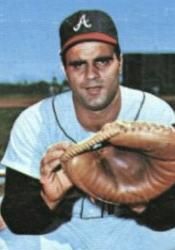 Joe Torre 1966-1968 | 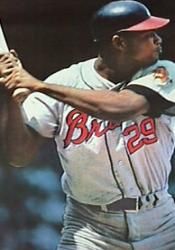 Felipe Alou 1966-1969 | 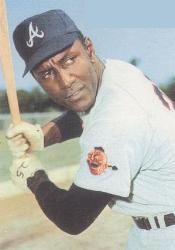 Rico Carty 1966-1972 | 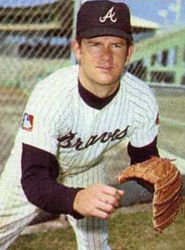 Pat Jarvis 1966-1972 | 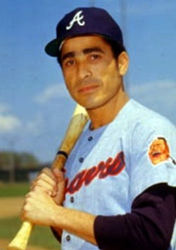 Felix Milian 1966-1972 | 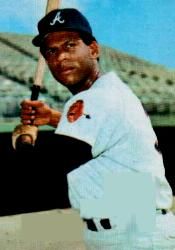 Orlando Cepeda 1969-1972 |
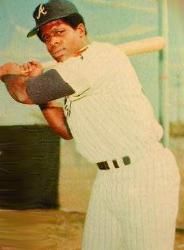 Earl Williams 1970-1972, 1975-1976 1971 Rookie of the Year |  Hank Aaron is greated by two fans after breaking the Babe's career HR record on April 8, 1974 | 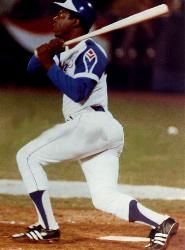 Hank Aaron 1966-1974 755 Career Home Runs | 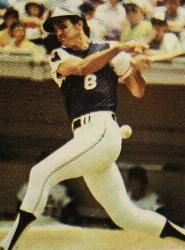 Davey Johnson 1972-1974 | 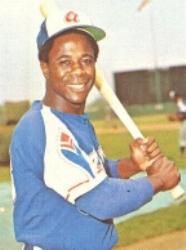 Ralph Garr 1968-1975 | |
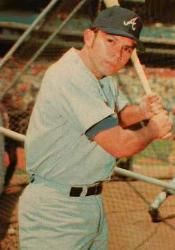 Darrell Evans 1969-1976, 1989 | 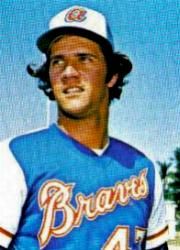 Buzz Capra 1974-1977 | 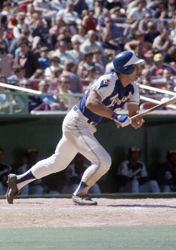 Mike Lum 1967-1975, 1979-1981 | 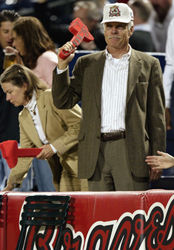 Ted Turner Owner 1976-2006 | 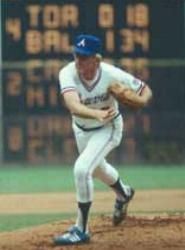 Phil Niekro 1966-1983, 1987 | 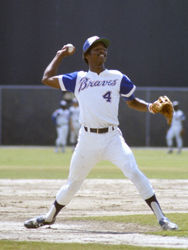 Jerry Royster 1978-1984, 1988 |
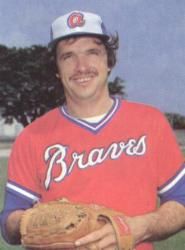 Rick Camp 1976-1985 | 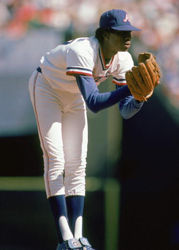 Pascual Perez 1982-1985 | 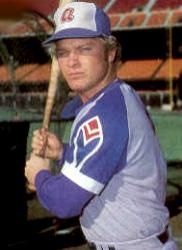 Bob Horner 2017-Present 1978-1986 1978 Rookie of the Year | 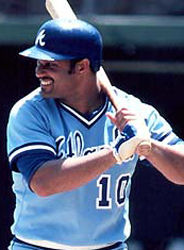 Chris Chambliss 1980-1986 | 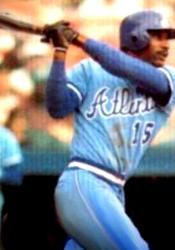 Claudell Washington 1981-1986 | 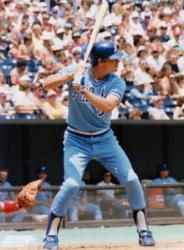 Dale Murphy rana 1982 & 1983 NL MVP |
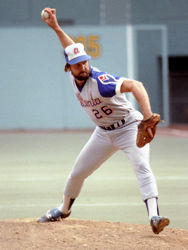 Gene Garber 1978-1987 | 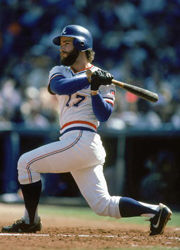 Glenn Hubbard 1978-1987 | 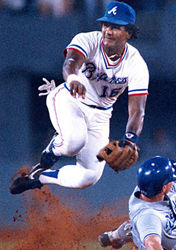 Rafael Ramirez 1980-1987 | 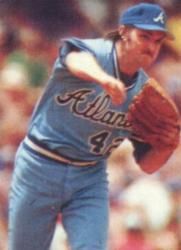 Rick Mahler 1979-1988, 1991 | 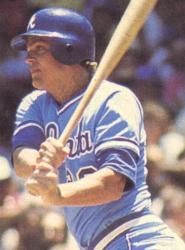 Bruce Benedict 1978-1989 | 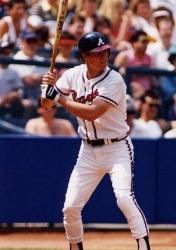 Dale Murphy 1976-1990 |
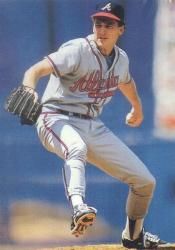 Charlie Leibrandt 1990-1992 | 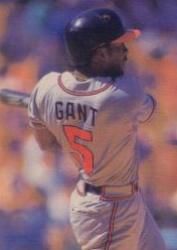 Ron Gant 1987-1993 | 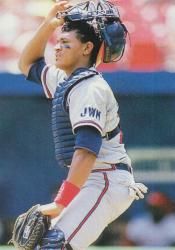 Francisco Cabrera 1989-1993 | 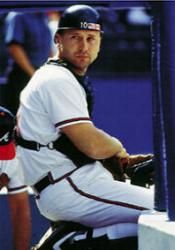 Greg Olson 1990-1993 | 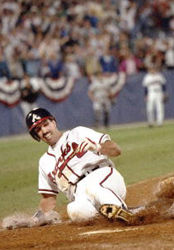 Sid Bream 1991-1993 1992 NLCS Winning Run | 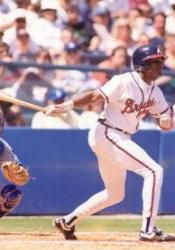 Otis Nixon 1991-1993, 1998-1999 |
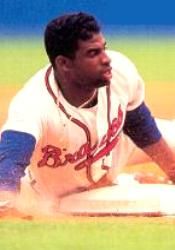 Deion Sanders 1991-1994 | 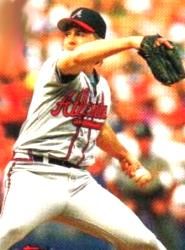 Kent Mercker 1989-1995, 2003 | 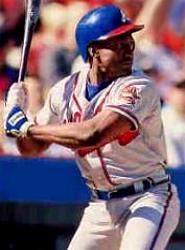 Mike Devereaux 1995 1995 NLCS MVP | 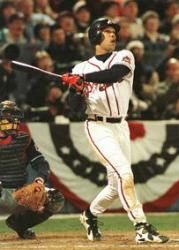 David Justice 1989-1996 1990 Rookie of the Year | 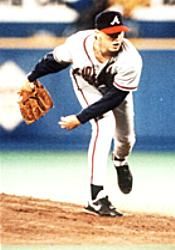 Steve Avery 1990-1996 1991 NLCS MVP | 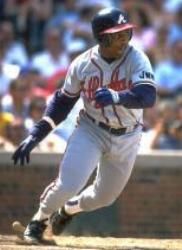 Terry Pendleton 1991-1994, 1996 1991 NL MVP |
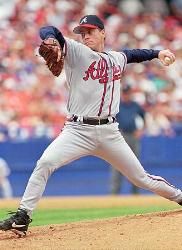 Tom Glavine 1991 & 1998 Cy Young 1995 World Series MVP | 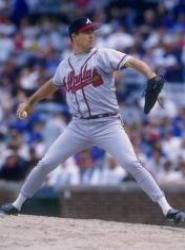 Greg Maddux 1993, 1994, 1995 Cy Young | 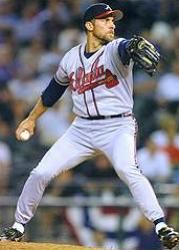 John Smoltz 1992 NLCS MVP 1996 Cy Young | 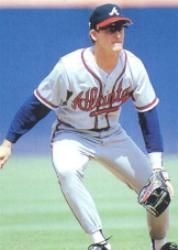 Jeff Blauser 1987-1997 | 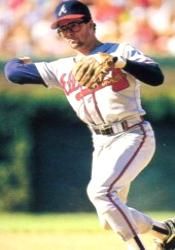 Mark Lemke 1988-1997 | 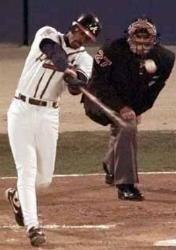 Fred McGriff 1993-1997 |
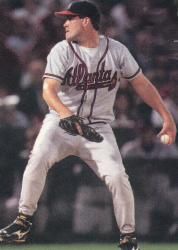 Denny Neagle 1996-1998 | 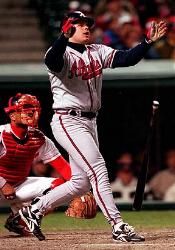 Ryan Klesko 1992-1999 | 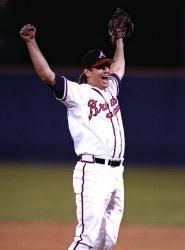 Mark Wohlers 1992-1999 | 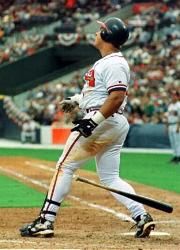 Andres Galarraga 1998-2000 | 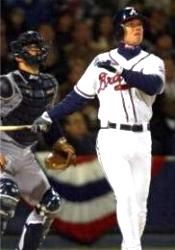 Chipper Jones 1999 NL MVP | 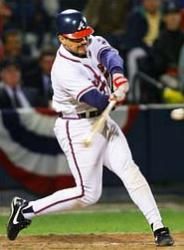 Eddie Perez 1994-2001, 2004-2005 1999 NLCS MVP |
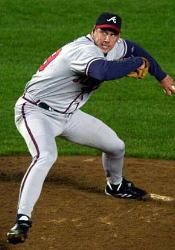 John Rocker 1998-2001 | 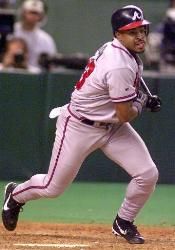 Brian Jordan 1999-2001, 2005-2006 | 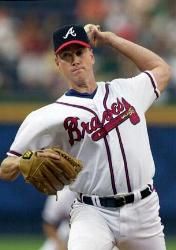 Tom Glavine 1987-2002, 2008 | 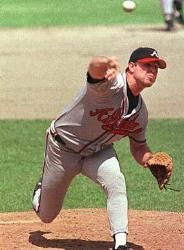 Kevin Millwood 1997-2002 | 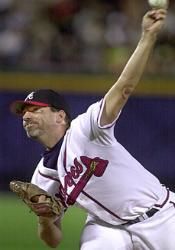 Mike Remlinger 1999-2002, 2006 | 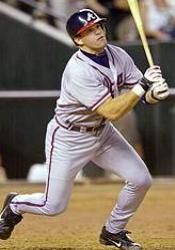 Javier Lopez 1992-2003 1996 NLCS MVP |
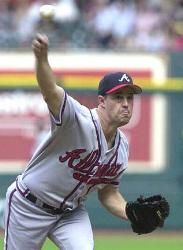 Greg Maddux 1993-2003 | 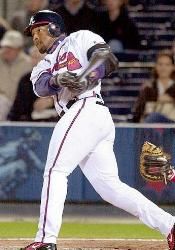 Gary Sheffield 2002-2003 | 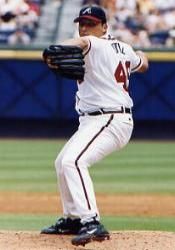 Russ Ortiz 2003-2004 | 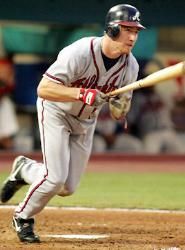 J.D. Drew 2004 | 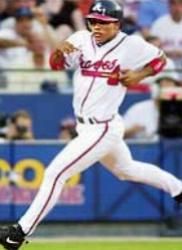 Rafael Furcal 2000-2005 2000 Rookie of the Year | 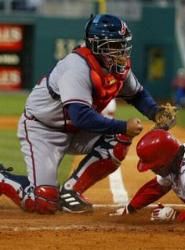 Johnny Estrada 2003-2005 |
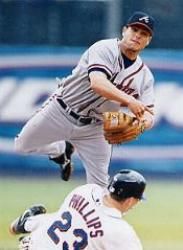 Marcus Giles 2001-2006 | 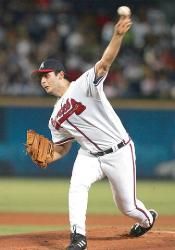 Horacio Ramirez 2003-2006 | 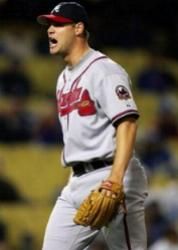 Chris Reitsma 2004-2006 | 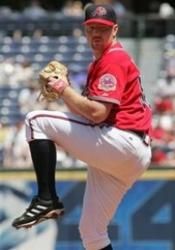 John Thomson 2004-2006 | 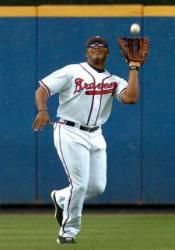 Andruw Jones 1996-2007 | 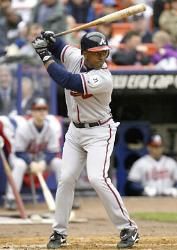 Julio Franco 2001-2005, 2007 |
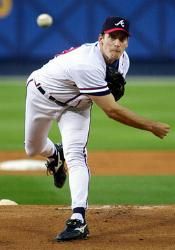 John Smoltz 1988-2008 | 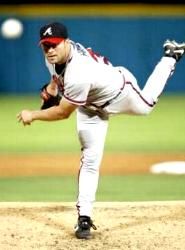 Mike Hampton 2003-2008 | 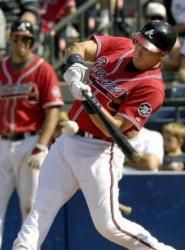 Mark Teixeira 2007-2008 | 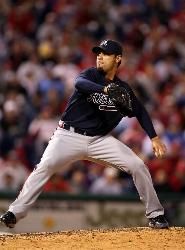 Mike Gonzalez 2007-2009 | 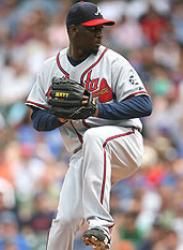 Rafael Soriano 2007-2009 | 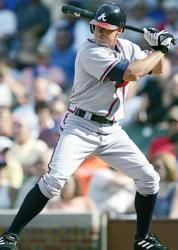 Jeff Francoeur 2005-2009, 2016 |
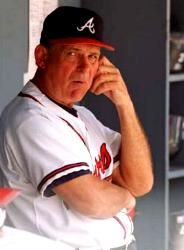 Bobby Cox MGR 1978-81, 1990-10 | 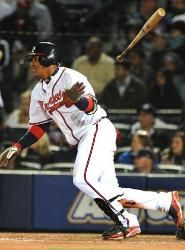 Yunel Escobar 2007-2010 | 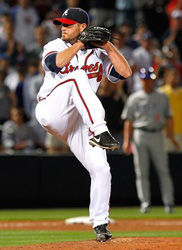 Billy Wagner 2010 | 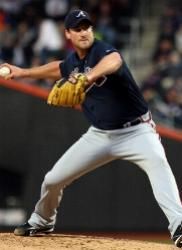 Derek Lowe 2009-2011 | 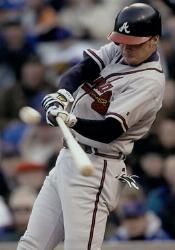 Chipper Jones 1993, 1995-2012 | 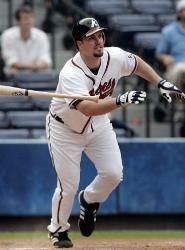 Matt Diaz 2006-2010, 2011-201 |
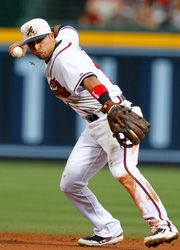 Martin Prado 2006-2012 | 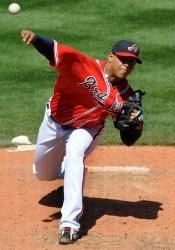 Jair Jurrjens 2008-2012 | 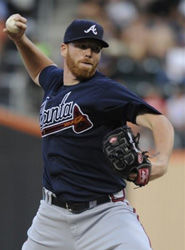 Tommy Hanson 2009-2012 | 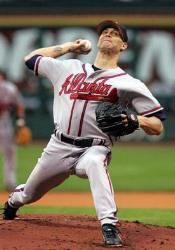 Tim Hudson 2005-2013 | 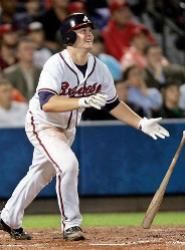 Brian McCann 2005-2013, 2019 | 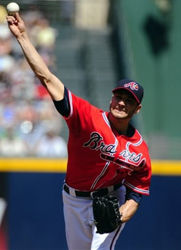 Brandon Beachy 2010-2013 |
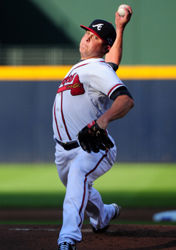 Kris Medlen 2010-2013 | 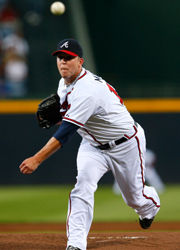 Paul Maholm 2012-2013 | 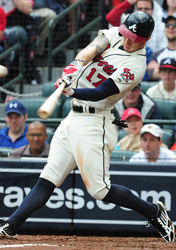 Jordan Schafer 2009, 2011, 2013-2014 | 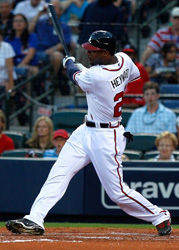 Jason Heyward 2010-2014 | 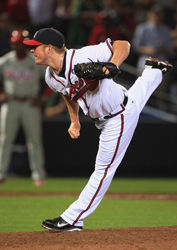 Craig Kimbrel 2010-2014 2011 Rookie of the Year | 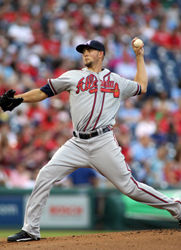 Mike Minor 2010-2014 |
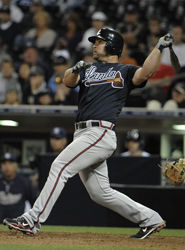 Dan Uggla 2011-2014 | 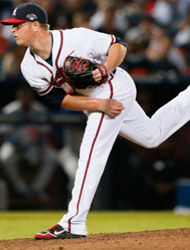 David Carpenter 2013-2014 | 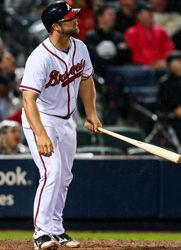 Evan Gattis 2013-2014 | 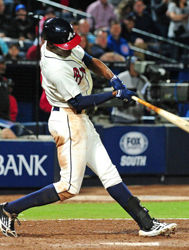 B.J. Upton 2013-2014 | 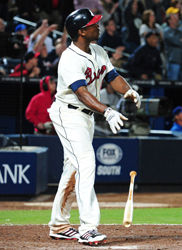 Justin Upton 2013-2014 | 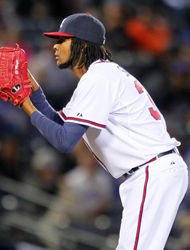 Ervin Santana 2014 |
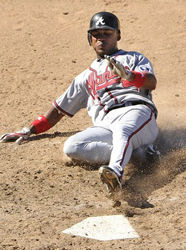 Michael Bourn 2011-2012, 2015 | 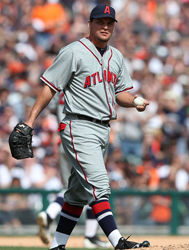 Luis Avilan 2012-2015 | 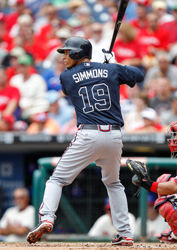 Andrelton Simmons 2012-2015 | 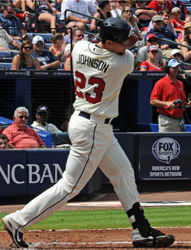 Chris Johnson 2013-2015 | 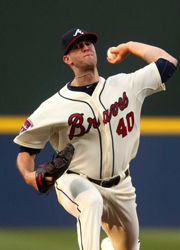 Alex Wood 2013-2015 | 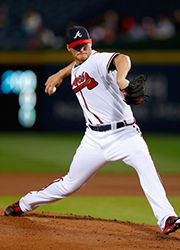 Shelby Miller 2015 |
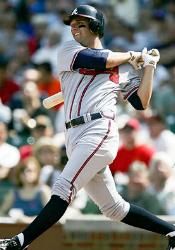 Kelly Johnson 2005, 2007-09, 15, 16 | 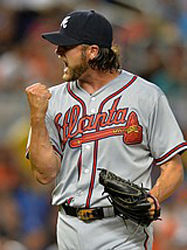 Jason Grilli 2015-2016 | 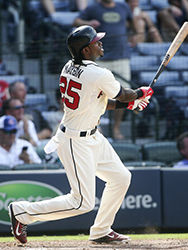 Cameron Maybin 2015-2016 | 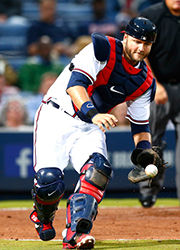 A.J. Pierzynski 2015-2016 | 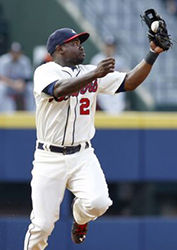 Adonis Garcia 2015-2017 | 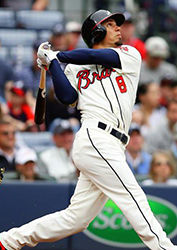 Jace Peterson 2015-2017 |
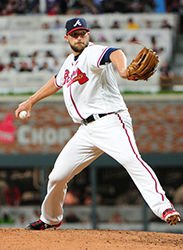 Jim Johnson 2015, 2016-2017 | 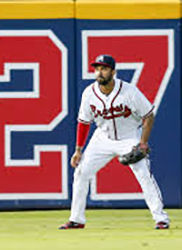 Matt Kemp 2016-2017 | 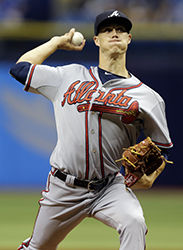 Matt Wisler 2015-2018 | 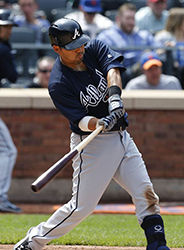 Kurt Suzuki 2017-2018 | 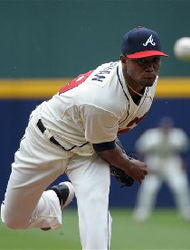 Julio Teheran 2011-2019 | 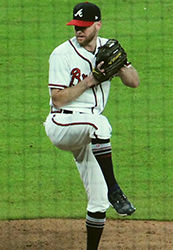 Jonny Venters 2010-2012, 2018-2019 |
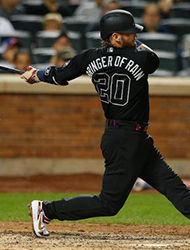 Josh Donaldson 2019 | 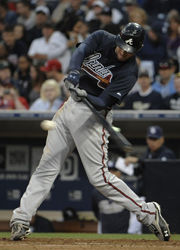 Freddie Freeman 2010-Present | 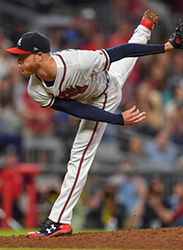 Mike Foltynewicz 2015-Present | 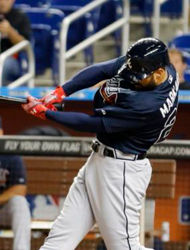 Nick Markakis 2015-Present | 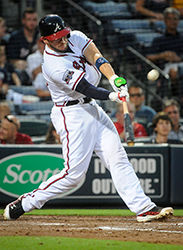 Tyler Flowers 2016-Present | 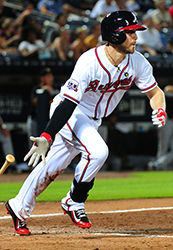 Ender Inciarte 2016-Present |
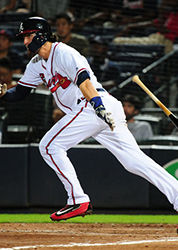 Dansby Swanson 2016-Present | 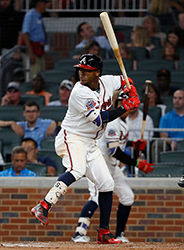 Ozzie Albies 2017-Present | 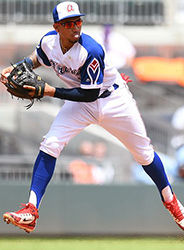 Johan Camargo 2017-Present | 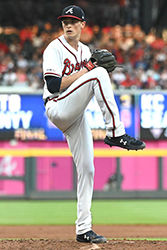 Max Fried 2017-Present | 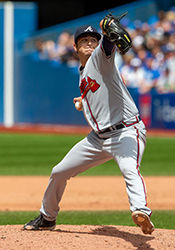 Luke Jackson 2017-Present | 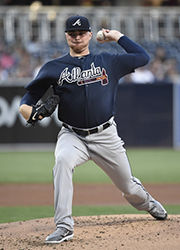 Sean Newcombe 2017-Present |
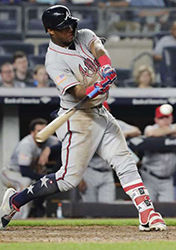 Ronald Acuna Jr. 2018-Present 2018 Rookie of the Year | 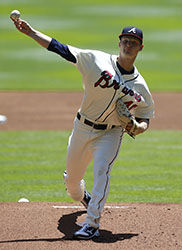 Mike Soroka 2018-Present | ||||
